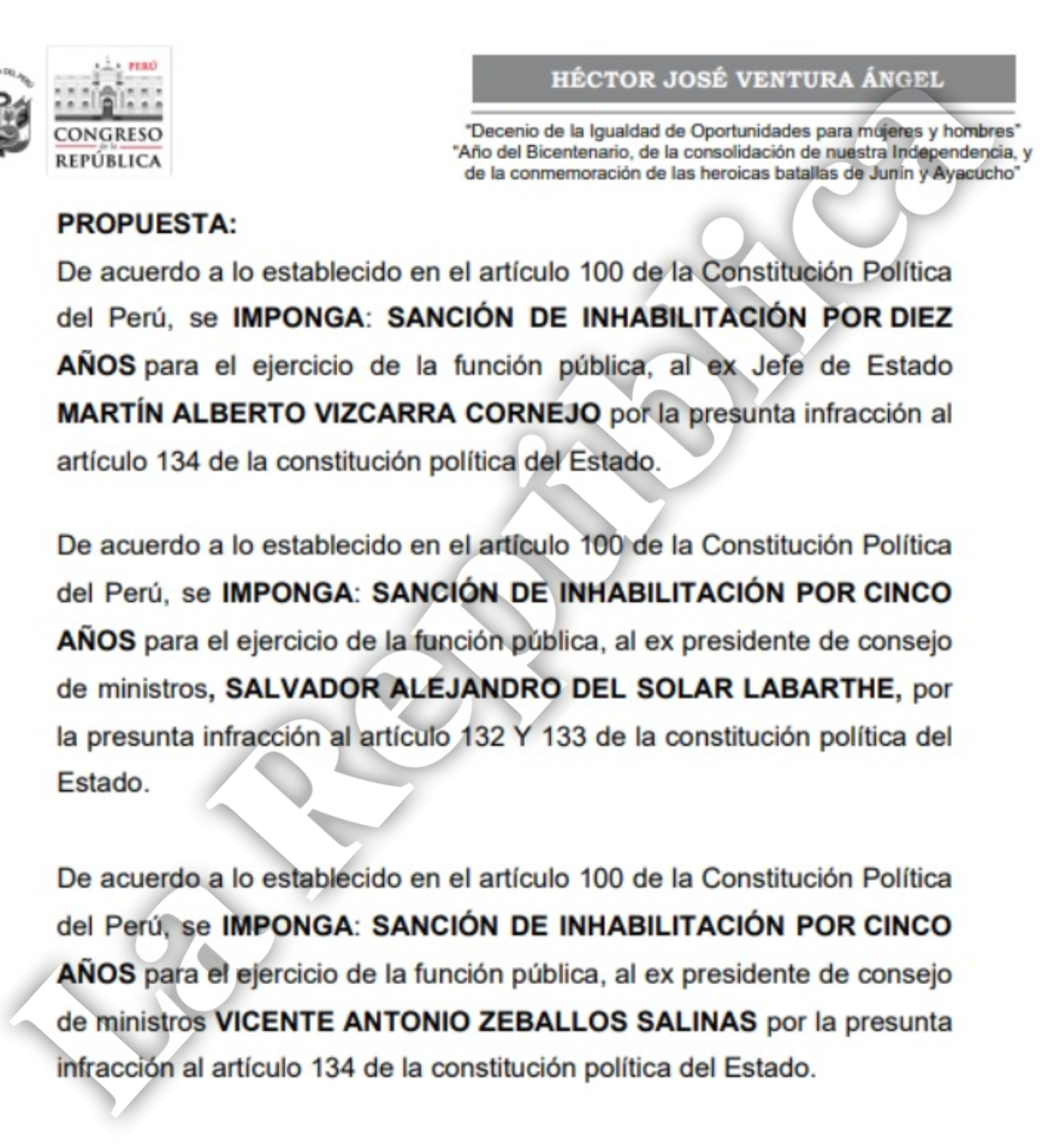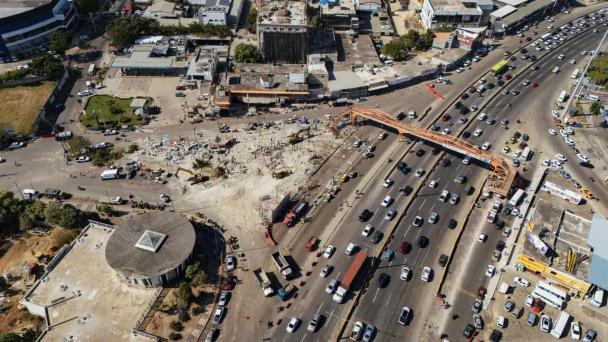The final report on the constitutional complaint by the dissolution of Congress of 2019, proposes disqualifying the former president from public office Martin Vizcarra and the former ministers Salvador del Solar and Vicente Zeballos.
The author of the report is the congressman of Popular Force, Hector Venturawho is the delegate in this constitutional accusation process.
YOU CAN SEE: Congress prioritizes revenge against its adversaries through constitutional accusations
In the case of the former president Martin VizcarraVentura proposes disqualifying him from public service for 10 years. While, with the former ministers Salvador del Solar and Vicente Zeballos, the sanction recommended is disqualification for 5 years.
The final report will be voted on this Tuesday at the Subcommittee on Constitutional Accusations of Congresschaired by the legislator Maria Acunafrom Alliance for Progress (APP).
YOU CAN SEE: The hunt for Congress with the impeachment trial
Fujimorism mocks the prescription
It was imminent that the orange congressman Hector Ventura It was going to conclude with accusing the three former high-ranking officials, but in the case of Del Solar there was a controversy because he requested that the constitutional complaint against him be filed because the deadline had expired.
Del Solar stopped being minister on September 30, 2019, the day Vizcarra dissolved Congress. The deadline to accuse him expired five years after he was removed from office, that is, on September 30 of last year.
YOU CAN SEE: The Prosecutor’s Office presented constitutional complaints against 24 congressmen so far this five-year period
However, Ventura’s final report appeals to a selective interpretation to point out that, like the Congress It did not work between October 1, 2019 and March 16, 2020, because it was dissolved in that period, those months do not count in the five-year period.
Therefore, under that argument, the deadline to accuse Del Solar would still expire on March 16, the date on which the 2020 – 2021 Congress began to operate.
The allegation is contradictory because Congress sent 12 constitutional complaints to the archive due to expiration. Among them are the cases of former congressmen Roberto Vieira and Jorge Castro.
The Attorney General’s Office presented a constitutional complaint against Vieira for alleged influence peddling. Vieira stopped being a congressman the same day that Del Solar ended his duties as prime minister. On October 3 of last year, the Plenary sent to the file the accusation against Roberto Vieira because the deadline to accuse him expired on September 30, 2024.
The Public Ministry had also filed a constitutional complaint against former congressman Castro for alleged concussion and violation of correspondence. Castro, like Vieira, stopped being a parliamentarian on September 30, 2019. At the end of last year, Congress sent his case to the archive because it expired.
YOU CAN SEE: Congress only sanctioned one of 16 congressmen who were denounced by the Attorney General’s Office
Whimsical and retroactive interpretation of the TC resolution
The constitutional complaint also indicates that in 2023 the Constitutional Court (TC)in a resolution on a jurisdictional claim, ruled against a previous ruling from 2020 that validated the dissolution of Congress.
As is known, on September 30, 2019, Del Solar made trust issue for a bill that proposed modifying the organic rule of the TC so that the election of its magistrates is by public contest and not by invitation, as Fujimorism and its allies intended to do in the Plenary.
Congress did not pay attention and continued with the election of the members of the TC. The Vizcarra government considered that in fact, Parliament had denied the confidence of Del Solar and the second cabinet crisis occurred – the first was in the PPK period with its former premier Fernando Zavala – and decided to dissolve it.
YOU CAN SEE: Congress: 17 special commissions spend S/ 463,000 on advisors every month
The Executive and Congress then had a jurisdictional conflict. In 2020, the TC ruled that the Vizcarra government had not proceeded in an unconstitutional manner.
However, in 2022, Congress feared that Pedro Castillo’s government would dissolve them through the figure of factual denial of the question of trust, because the Plenary Session had refused to discuss a law that modified the rule referring to the referendum. for constitutional reforms.
The congressional coalition presented a jurisdictional lawsuit and the new Constitutional Court ruled against the figure of factual denial of the question of trust and questioned the 2020 resolution.
YOU CAN SEE: Congress blocks Jorge Torres Saravia case: none of its officials clarify who recommended his hiring
However, the then president of the TC, Francisco Morales, said on Canal N that, although they disagree with that previous verdict, that does not mean that the case of the jurisdictional conflict in the Castillo government can be interpreted retroactively to reject the dissolution of Parliament in 2019.
Morales made it clear that this case is now res judicata.
Background of the constitutional accusation
But that matters little in the current Congress. Ventura’s final report was ready last month. His colleague from Renovación Popular, Alejandro Muñante, demanded that Acuña submit that proposal to debate in the Subcommittee on Constitutional Accusations.
It is evident that Popular ForceAPP and its allies will not give Vizcarra any respite. Their fear was and is that Vizcarra and Del Solar will participate in the 2026 general elections. Del Solar has stressed that he has no interest in being a candidate. Vizcarra does want to, but this would already be his third disqualification.
In essence, the disqualification of former high officials, through constitutional accusations, has become a way of displacing electoral competition and subdue the detractors of this Congress. It is a hunt.
















